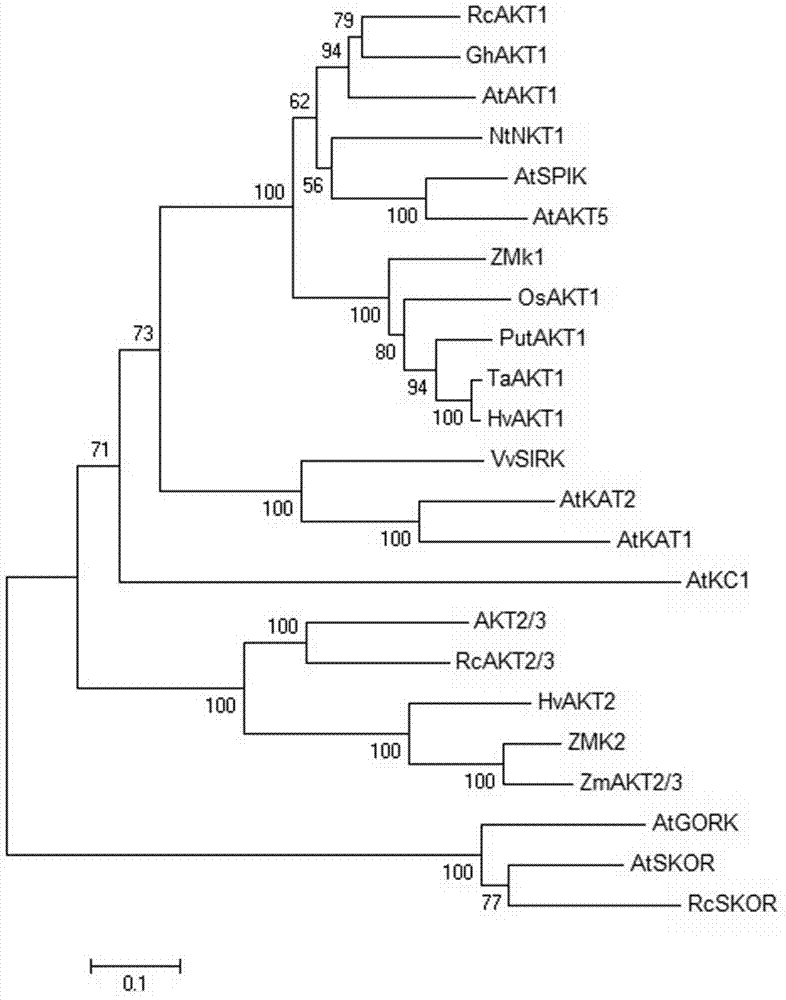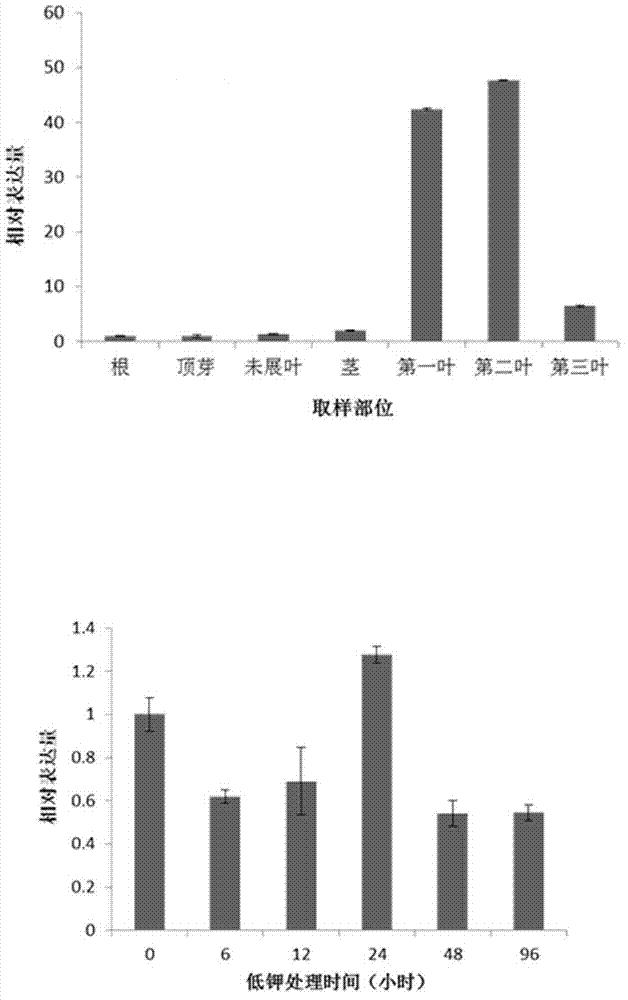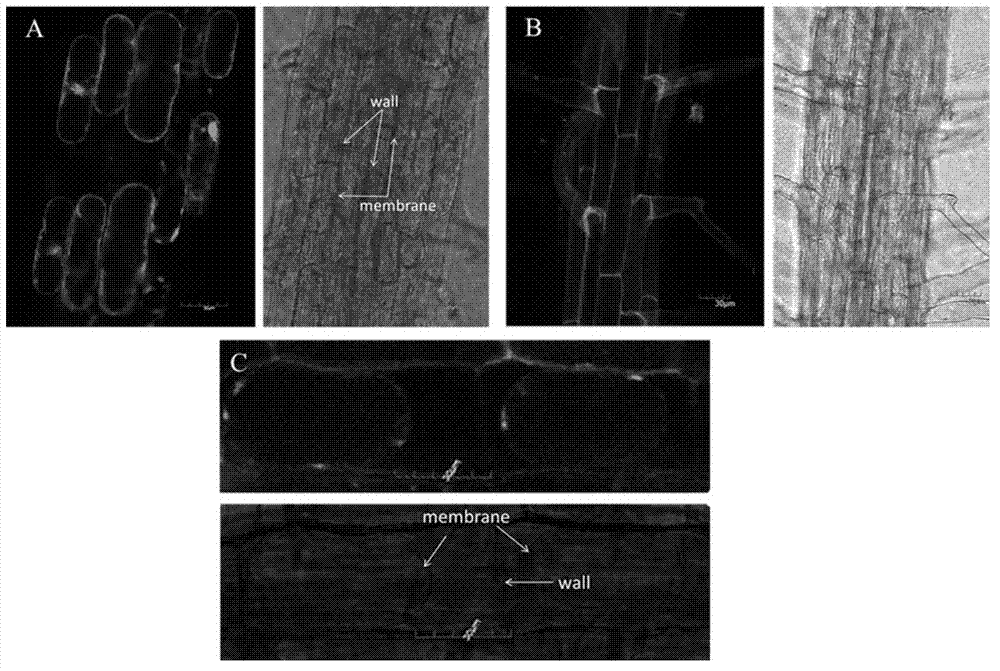Protein related to plant potassium ion absorption capacity, and coding gent and application thereof
A protein and gene technology, applied in plant genetic improvement, botanical equipment and methods, applications, etc., can solve the problem of low potassium absorption capacity, and achieve the effect of improving low potassium tolerance
- Summary
- Abstract
- Description
- Claims
- Application Information
AI Technical Summary
Problems solved by technology
Method used
Image
Examples
Embodiment 1
[0044] Example 1. Discovery, expression analysis and subcellular localization of GhAKT1 protein and its coding gene
[0045] 1. Discovery of GhAKT1 protein and its coding gene
[0046] Use the database to search and compare related gene sequences of other species, assemble and verify the EST sequence of cotton, and perform 5'RACE and 3'RACE, obtain a new protein from the cotton variety "Liaomian 17", and name it GhAKT1 protein , as shown in Sequence 1 of the Sequence Listing (composed of 875 amino acid residues). The gene encoding GhAKT1 protein was named as GhAKT1 gene, and the open reading frame of its cDNA is shown in sequence 2 of the sequence table (consisting of 2628 nucleotides).
[0047] In order to analyze the difference between the GhAKT1 gene and the homologous gene sequences of other species, firstly, the multiple sequence alignment structure of the EBP1 sequence was constructed using the clustalX version1.83, using the default parameters of the software. Accordi...
Embodiment 2
[0055] Embodiment 2, the acquisition of transgenic plants
[0056] 1. Construction of recombinant plasmids
[0057] 1. Extract the total RNA from the leaves of the cotton variety "Liaomian No. 17" and reverse transcribe it into cDNA.
[0058] 2. Using the cDNA in step 1 as a template, perform PCR amplification with a primer pair composed of F1 and R1 to obtain a PCR amplification product.
[0059] F1: 5'-GC TCTAGA ATGTTTCGAGGGTCAGTACTAT-3'
[0060] R1: 5'-GG GGTACC TTAAGGGTTTTGGGTGTCATTA-3'
[0061] 3. The PCR amplified product of step 2 was double-digested with restriction endonucleases XbaI and KpnI, and the digested product was recovered.
[0062] 4. Digest the vector pBIB with restriction endonucleases XbaI and KpnI to recover a vector backbone of about 10000 bp.
[0063] 5. Ligate the digested product of step 3 with the vector backbone of step 4 to obtain the recombinant plasmid PBIB-GhAKT1. The schematic diagram of the structure of the recombinant plasmid PBIB-G...
Embodiment 3
[0091] Embodiment 3, identification of transgenic plants
[0092] MS medium formula (potassium ion concentration is about 19.9mM):
[0093] Macroelements: 1.65g NH 4 NO 3 , 1.9g KNO 3 , 0.17g KH 2 PO 4 , 0.37g MgSO 4 ·7H 2 O, 0.44g CaCl 2 2H 2 O;
[0094] Trace elements: 22.3mg MnSO 4 4H 2 O, 8.6mg ZnSO 4 ·7H 2 O, 0.025mg CoCl 2 ·6H 2 O, 0.025mg CuSO 4 ·5H 2 O, 0.025mg Na 2 MoO 4 2H 2 O, 0.83mg KI, 6.2mg H 3 BO 3 ;
[0095] Iron salt: 27.8mg FeSO 4 ·7H 2 O, 37.3 mg Na 2 EDTA;
[0096] Dissolve macroelements, trace elements, iron salts and 9 g of agar in water and dilute to 1 L with water to obtain MS medium. Low Potassium Medium Formula:
[0097] Macroelements: 2.3g NH 4 NO 3 , 0.37g MgSO 4 ·7H 2 O, 0.144g NH 4 h 2 PO 4 , 0.44g CaCl 2 2H 2 O;
[0098] Trace elements: same as those in MS medium.
[0099] Iron salt: the same as the iron salt in MS medium.
[0100] Dissolve macroelements, trace elements, iron salts and 9g agar in water and ...
PUM
 Login to View More
Login to View More Abstract
Description
Claims
Application Information
 Login to View More
Login to View More - Generate Ideas
- Intellectual Property
- Life Sciences
- Materials
- Tech Scout
- Unparalleled Data Quality
- Higher Quality Content
- 60% Fewer Hallucinations
Browse by: Latest US Patents, China's latest patents, Technical Efficacy Thesaurus, Application Domain, Technology Topic, Popular Technical Reports.
© 2025 PatSnap. All rights reserved.Legal|Privacy policy|Modern Slavery Act Transparency Statement|Sitemap|About US| Contact US: help@patsnap.com



